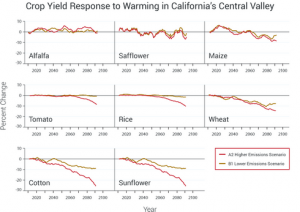Food securityGlobal warming could help crops’ productivity
Many scientists fear that global warming will hit staple food crops hard, with heat stress, extreme weather events, and water shortages. On the other hand, higher levels of carbon dioxide — the main cause of ongoing warming — is known to boost many plants’ productivity, and reduce their use of water. So, if we keep pouring more CO2 into the air, will crops fail, or benefit? A new study tries to disentangle this complex question. It suggests that while greater warmth will reduce yields of some crops, higher CO2 could help mitigate the effects in some regions, unless other complications of global warming interfere.

Projected climate change impact on food crops // Source: globalchange.gov
Many scientists fear that global warming will hit staple food crops hard, with heat stress, extreme weather events, and water shortages. On the other hand, higher levels of carbon dioxide — the main cause of ongoing warming — is known to boost many plants’ productivity, and reduce their use of water. So, if we keep pouring more CO2 into the air, will crops fail, or benefit? A new study tries to disentangle this complex question. It suggests that while greater warmth will reduce yields of some crops, higher CO2 could help mitigate the effects in some regions, unless other complications of global warming interfere.
Columbia University notes that the study, by sixteen researchers from a half-dozen countries, uses newly available crop models and data from ongoing large-scale field experiments. It appears this week in the journal Nature Climate Change.
“Most of the discussion around climate impacts focuses only on changes in temperature and precipitation,” said lead author Delphine Deryng, an environmental scientist at Columbia University’s Center for Climate Systems Research, the NASA Goddard Institute for Space Studies and the University of Chicago’s Computation Institute. “To adapt adequately, we need to understand all the factors involved.” Deryng cautions that the study should not be interpreted to mean that increasing carbon dioxide is a friend to humanity — only that its direct effects must be included in any calculation of what the future holds.
Many studies say that as temperatures rise, crops across the world will suffer as average temperatures become unsuitable for traditionally grown crops, and droughts, heat waves or extreme bouts of precipitation become more common. Agricultural scientists say that losses could be mitigated to some extent by switching crops, developing varieties adapted to the new conditions, or moving some crop-growing regions poleward. But such adaptations pose daunting challenges.
